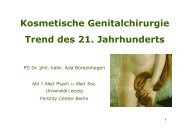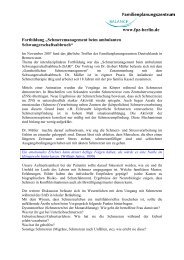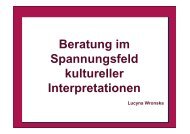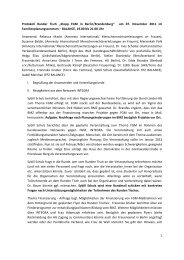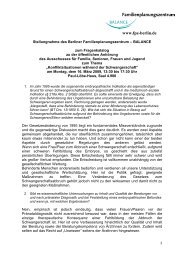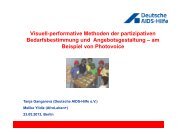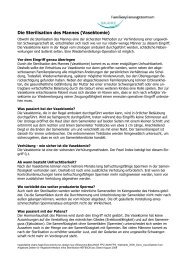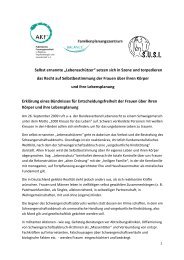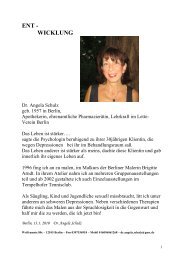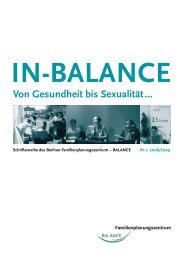Listening to African Voices - FPZ
Listening to African Voices - FPZ
Listening to African Voices - FPZ
Create successful ePaper yourself
Turn your PDF publications into a flip-book with our unique Google optimized e-Paper software.
Table 15: Proportion of immigrants from groups and families practicing FGM/C (Ghana)FGM/C takes place in my ethnic groupYesNoDon’tknow Yes NoFGM/C has been taking place in my familyDon’tknowDoesn’tanswerWomen (n = 263) 29 (11.2%) 224 (86.5%) 6 (2.3%) 22 (8.6%) 228 (89.4%) 4 (1.6%) 1 (0.4%)Men (n = 254) 30 (12.0%) 207 (83.1%) 12 (4.8%) 12 (4.8%) 228 (91.9%) 7 (2.8%) 1 (0.4%)Total (n = 518) 59 (11.6%) 431 (84.8%) 18 (3.5%) 34 (6.8%) 456 (90.7%) 11 (2.2%) 2 (0.4%)pants, one man and one woman expressed the intention <strong>to</strong>subject their daughters <strong>to</strong> the practice. The woman’s threedaughters have been living in Ghana all their lives. The man’sdaughter, however, is living in Hamburg. She was integratedin the follow-up project (see section 3.5.1). In conclusion,none of the girls living in Hamburg had been subjected <strong>to</strong> theFGM/C but there was one girl at risk of being subjected <strong>to</strong> it.5.5.1.4. Perceptions related <strong>to</strong> the practiceAlmost the <strong>to</strong>tality of the sample (98.5%) of the interviewedparticipants of Ghanaian origin had heard of FGM/C. Thosewho had not heard about it (nine participants) were Christiansfrom the Southern regions. Some participants of theyounger generation reported having only learnt about theexistence of the practice in Germany through the media, forinstance, the book or the movie Desert Flower by Waris Dirie.“I read about this practice in Desert Flower and it mademe upset. It is cruel and makes no sense.” (young womanof Ghanaian origin)A lot of participants immediately distanced themselves fromthe FGM/C, sharing that it was not part of their culture andthat it was not done in their country at all or only in ruralareas of the Northern region.Table 16: Perceptions related <strong>to</strong> FGM/C among immigrants from GhanaHas heardof FGM/CConsidersthe practicehas benefitsCleanliness/hygieneSocialacceptanceAssociates FGM/C withBettermarriageprospectsPreservationof virginityReligiousapprovalReduction ofsexual desireof womanSexWomen 98.1% 23.6% 2.3% 5.8% 10.5% 10.5% 0.4% 12.4%Men 98.8% 32.1% 3.6% 8.8% 11.6% 14.9% 0.4% 14.9%Age groups16-30 98.1% 20.1% 1.3% 5.0% 8.2% 9.4% 0.6% 11.3%31-44 98.6% 28.4% 2.0% 7.8% 12.7% 12.7% 0% 14.7%45+ 98.5% 36.1% 4.5% 9.0% 11.3% 15.8% 0.8% 15.8%RegionSouth 25 98.4% 23.6% 2.5% 6.6% 9.1% 10.7% 0.2% 12.3%North 26 100% 59.7% 6.5% 12.9% 25.8% 27.4% 1.6% 24.2%ReligionMuslim 100% 59.3% 6.8% 11.9% 20.3v 25.4% 3.4% 27.1%Christian 98.1% 22.3% 2.6% 6.9% 9.5% 11.2% 0% 11.2%Non-believer 93.8% 60% 0% 0v 20.0% 13.3% 0% 26.7%Education (years)0-9 98.4% 35.0% 5.0% 3.3% 16.7% 11.7% 0% 11.7%10-14 97.9% 28.3% 2.2% 6.1% 9.1% 12.6% 0% 13.9%15+ 99.0% 26.2% 3.1% 10.5% 11.0% 13.1% 1.0% 14.7%Total 98.5% 27.8% 3.0% 7.3% 11.0% 12.6% 0.4% 13.6%25 The category “South” designates six regions: Ashanti, Western,Central, Greater Accra, Eastern and Volta.26 The category “North” designates the Brong Ahafo, the Northern,the Upper East and the Upper West region.<strong>Listening</strong> <strong>to</strong> <strong>African</strong> <strong>Voices</strong> 39





